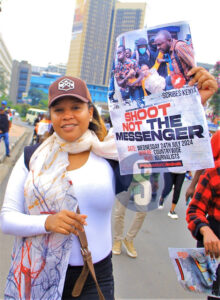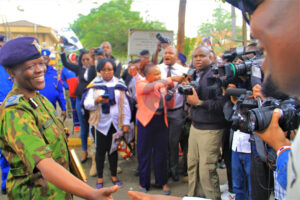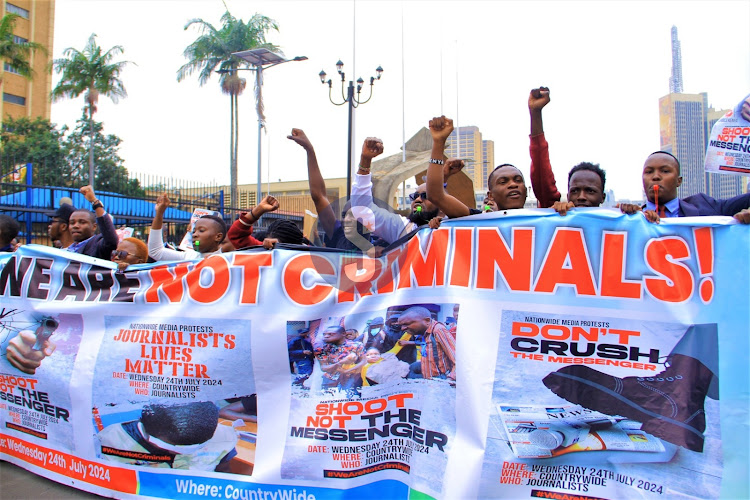Today, we’re diving into a serious but important topic. Journalists in Nairobi held a peaceful protest, and I thought we should chat about why this is happening and what it means for all of us.
You see, lately, there’s been a worrying trend of police brutality and intimidation targeting our brave reporters. It’s been especially bad during anti-government demonstrations.
As someone who cares about the free flow of information, this really gets to me. Let’s break it down together, shall we?
Background on Police Brutality Against Journalists
Alright, let’s talk about what’s been going on. In recent months, we’ve seen some pretty scary stuff happening to journalists who are just trying to do their job.
For example, last month, a cameraman from a local TV station was beaten up while covering a protest. He ended up with a broken arm and couldn’t work for weeks.

Another incident that really stuck with me was when a female reporter was threatened by police officers who said they’d “teach her a lesson” if she didn’t stop filming.
Can you imagine how terrifying that must have been? Another most worrying case happened last week when a local TV station journalist was shot by police while covering protests in one of our cities.
This shook the whole journalism field as a whole. These aren’t just isolated cases. Many journalists are feeling scared to go out and report on important events. It’s like they’re caught between a rock and a hard place – they want to inform the public, but they’re worried about their own safety.
Purpose of the Protest
So, what’s the goal of this protest? Well, our journalist friends have a few things in mind:
- They want to raise awareness about what’s happening. Many people might not know about these incidents, and it’s important that everyone understands the challenges journalists face.
- They’re calling for accountability. The police officers involved in these incidents should face consequences for their actions.
- Most importantly, they’re advocating for better protection for journalists. After all, a free press is a cornerstone of any healthy democracy, right?
I chatted with Sarah, one of the protest organizers, and she told me, “We’re not asking for special treatment. We just want to be able to do our jobs without fear of violence or intimidation. That’s not too much to ask, is it?”
Organizers and Participants
The protest is being organized by a coalition of media organizations, including the Kenyan Journalists Association and the Nairobi Press Club.
They’ve been working hard to get the word out and ensure everything goes smoothly. From what I’ve heard, they’re expecting a pretty big turnout.
Journalists from all major media houses have pledged to participate, and even some international correspondents are planning to join in solidarity. It’s heartwarming to see the media community coming together like this.
Route and Logistics of the Protest
Here’s the plan for the protest:
- The march started at Uhuru Park (pretty fitting, right? Uhuru means “freedom” in Swahili).
- From there, they made their way down Kenyatta Avenue.

- The final stop was at the steps of the National Police Service Headquarters.
The organizers have been in touch with local authorities to ensure everything went smoothly.
They also arranged for volunteer marshals to help keep things peaceful and organized. Safety was a top priority, especially given the nature of what they were protesting against.
Reactions from Authorities and the Public
Now, you might be wondering how the government and police are reacting to all this. Well, it’s a bit of a mixed bag.
The National Police Service released a statement saying they “respect the right to peaceful protest” but also defended their actions during previous demonstrations.
On the other hand, many members of the public are showing support for the journalists.
I’ve seen lots of supportive messages on social media, and several civil society groups have issued statements backing the protest. “A free press is the watchdog of democracy.
We stand with our journalists,” said one tweet that’s been shared thousands of times.
Expected Outcomes and Future Actions
So, what might come out of this protest? Well, the journalists are hoping for a few things:
- They want the government to launch an independent investigation into incidents of police brutality against journalists.
- They’re calling for better training for police officers on how to interact with the media during protests and other events.
- They’re also pushing for stronger legal protections for journalists.
But this protest isn’t the end of their efforts. They said they’re planning to keep the pressure on through continued advocacy, public awareness campaigns, and possibly even legal action if necessary.
Conclusion
As we wrap up our chat about this important event, let’s take a moment to reflect on why this matters to all of us. Journalists play a crucial role in our society.
They’re our eyes and ears, helping us understand what’s happening in our world. When journalists can’t do their jobs safely, we all lose out. We lose access to important information.
We lose the ability to hold those in power accountable. We lose a vital part of our democracy. So, even if you’re not a journalist yourself, this protest is about protecting something that affects us all – the right to know what’s going on in our world.
Let’s hope it leads to positive changes and a safer environment for the brave folks who keep us informed. What are your thoughts on this? I’d love to hear your perspective!

